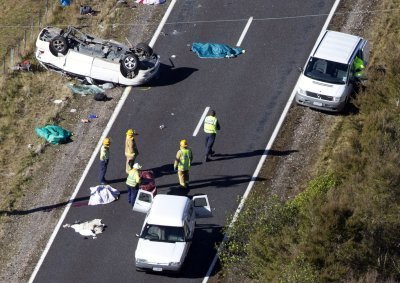13 Things To Do After a Crash
il y a 12 années, 3 mois - 4 Octobre 2013, Wheels News

Confusion, shock, perhaps you're injured... A crash can be traumatic and that can cause most drivers to be so overwhelmed that they forget what to do afterwards. Check out our top 13 post-crash tips!
A crash can be an extremely traumatic experience and sadly they've become a common occurrence for many South Africans. There's a lot of confusion in the event of a crash and most drivers are overwhelmed. Mark Mathomes, owner of Plan B Roadside Assistance, shares his insight on the "do’s and dont’s" when the screaming stops.
Mathomes has 20 years experience in roadside assistance, says it's evident that many South African's have not been educated on the steps that need to be followed post-crash.
So, here are the 13 important things to remember to do:
- Ensure that you and your passengers are out of harm’s way. Have all passenger vacate the vehicle and move out of danger.
- Check if anyone has been injured. If there are any injuries call an ambulance or the traffic department which will in-turn alert them.
- It's imperative to take down necessary details of parties involved in the incident. You need names, addresses, phone numbers and email addresses so you or your insurance company can contact them. Other important particulars include ID numbers, licence numbers (include the code on the licence), vehicle registration numbers and the make and models of other vehicles.
- Check that all licence discs are valid and that the registration plate matches the licence disc.
- Note important information such as the time of the crash, location, number of passengers, weather conditions and road surface conditions.
- Take as many images of damage done to all vehicles involved. Should a party make a false claim the images will serve as proof against their claim.
- All cases should be reported to the police, no matter how slight the damage. Should you not report the case the other party could claim that it was a hit-and-run or that you refused to provide your details. You’ll need an accident report to claim from your insurance.
- Even though you may be angry or emotional, losing your temper could make the aftermath of the incident even worse. Stay calm and collected.
- Don’t leave the scene until all details have been noted.
- Don’t be dishonest when giving your statement to the police. By lying or exaggerating you are only jeopardising yourself.
- Ask witnesses for their names and contact details, just in case legal action is taken.
- Don’t forget to keep proper documentation of the incident; you will need proof to show your insurance company so take pictures using your phone or camera.
- Don’t wait too long to claim on insurance. If injuries occurred, it's important to mention this to your insurer to avoid any major financial claims.


